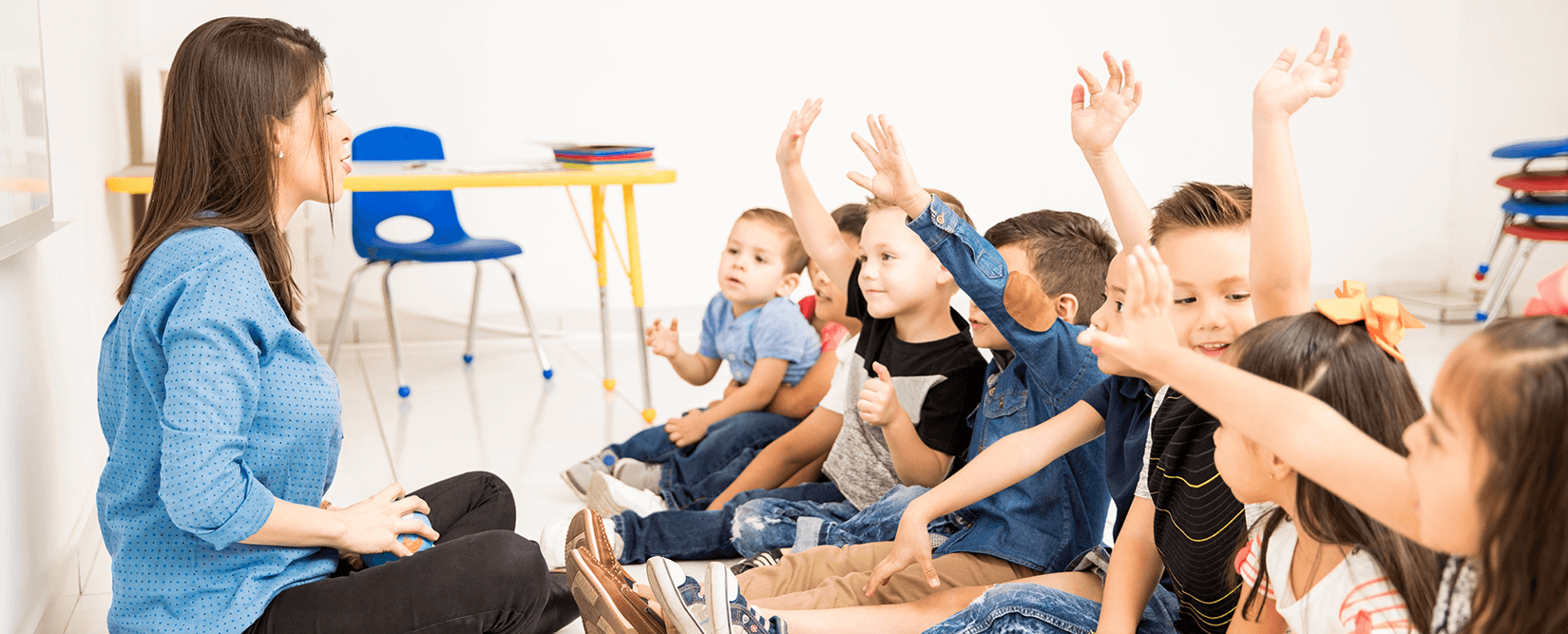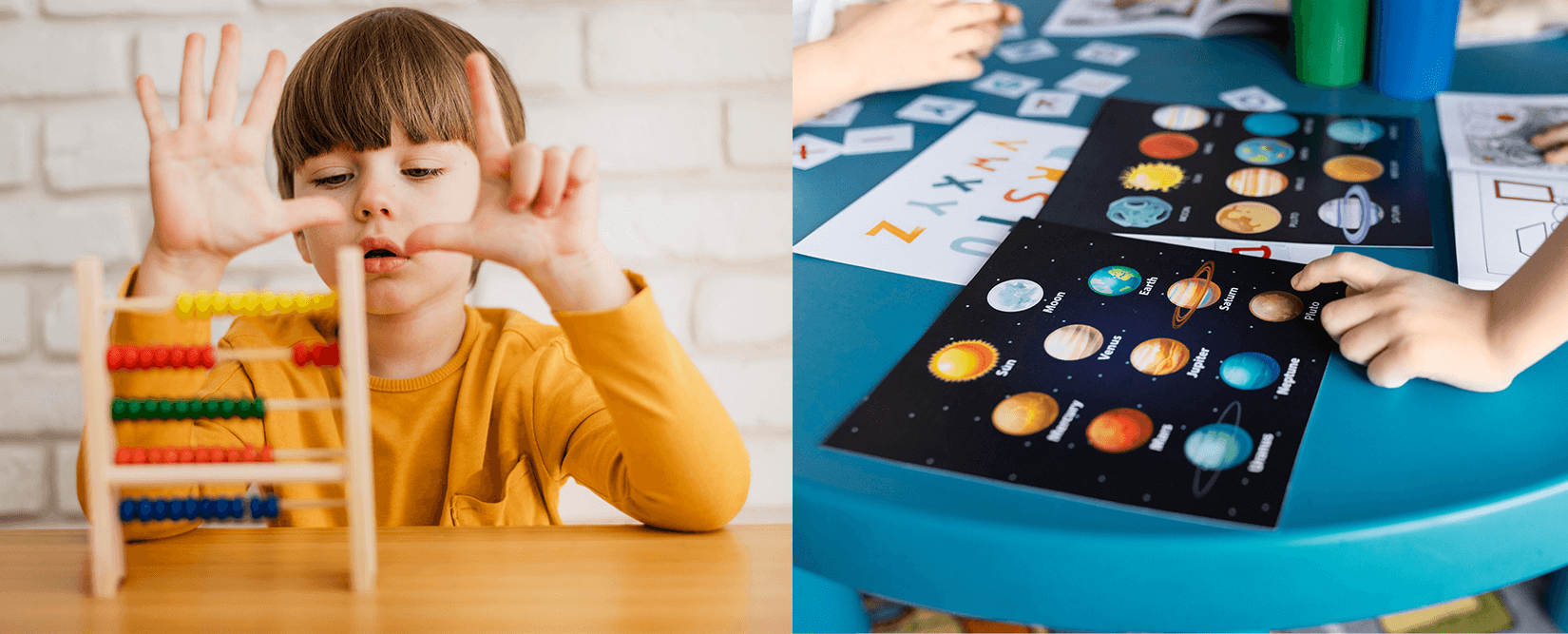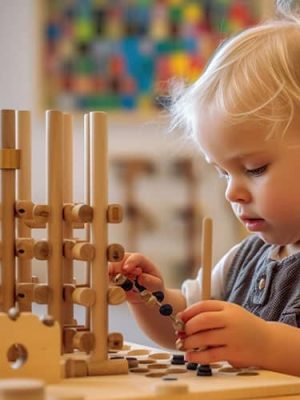Creating a robust curriculum for children under 6 years of age that encompasses mathematics, language, science, social-emotional intelligence, problem-solving skills, leadership, self-confidence, and general knowledge requires a holistic approach.
Here’s a suggested framework for the Personality Development:
Curriculum Framework for Children Under 6

1. Mathematics
- Concepts: Numbers, counting, basic shapes, measurement, patterns.
- Activities:
o Counting games with objects (blocks, toys).
o Shape scavenger hunts in the classroom.
o Simple addition and subtraction using visual aids.
o Measurement activities (e.g., using rulers or measuring cups in cooking).
2. Language Development
- Concepts: Vocabulary building, phonemic awareness, storytelling, basic writing skills.
- Activities:
o Daily read-aloud sessions with diverse books.
o Rhyming games and songs to enhance phonemic awareness.
o Storytelling circles where children share personal stories.
o Interactive writing activities (e.g., creating a class book).
3. Science
- Concepts: Nature, basic biology, physical science, simple experiments.
- Activities:
o Basic study of plants and animals.
o Hands-on experiments (e.g., mixing colors or growing plants).
o Exploration of weather and seasons through art projects.
o Use of magnifying glasses to explore textures and small objects.
4. Social-Emotional Intelligence
- Concepts: Understanding emotions, empathy, cooperation, conflict resolution.
- Activities:
o Emotion charades to help identify and express feelings.
o Role-playing scenarios to practice empathy and cooperation.
o Circle time discussions about daily feelings and experiences.
o Group projects that require teamwork and sharing.
5. Problem Solving Skills
- Concepts: Critical thinking, reasoning, flexibility in thinking.
- Activities:
o Puzzles and logic games tailored to age level.
o Open-ended questions during play (e.g., “What can we build with these blocks?”).
o Story problems that require children to think of solutions.
o Group challenges that encourage brainstorming and collaboration.
6. Leadership
- Concepts: Decision-making, taking initiative, responsibility.
- Activities:
o Assigning roles in group activities (e.g., leader, timekeeper).
o Encouraging children to lead a project or game.
o Projects where children can set goals and plan together.
o Discussions about what makes a good leader and examples.
7. Self Confidence
- Concepts: Self-expression, self-esteem, resilience.
- Activities:
o Show-and-tell sessions to celebrate individual interests.
o Positive affirmation activities (e.g., “I am good at…”).
o Opportunities to try new activities without fear of failure.
o Celebrating accomplishments, big and small, as a group.
8. General Knowledge
- Concepts: Understanding the world, cultural awareness, basic geography.
- Activities:
o Introductions to different cultures through stories, music, and food.
o Simple maps and globe activities to understand locations.
o Guest speakers from various backgrounds to share experiences.
o Community walks to explore local landmarks and services.
Implementation Strategies
- Integrated Learning: Use thematic units that incorporate multiple subjects (e.g., a unit on “Plants” that includes science, math, and art).
- Play-Based Learning: Prioritize play as a method for learning, allowing children to explore concepts through hands-on experiences.
- Continuous Assessment: Use observation and anecdotal records to assess children’s progress and adapt the curriculum as needed.
- Family Engagement: Involve families through workshops and resources that encourage learning at home.
Conclusion
This curriculum framework focuses on fostering a well-rounded development in young children, preparing them for future learning and social interactions. Each component is interconnected, promoting a comprehensive educational experience.
Personality Development Based on Montessori Teaching Style

Key Principles of Montessori for Personality Development
The Montessori method emphasizes a holistic approach to education, focusing on fostering the overall development of the child, including personality development.
Here’s how to integrate personality development within the Montessori framework for children under 6 years of age:
1. Child-Centered Learning
- Allow children to choose activities that interest them, fostering independence and self-discovery.
- Respect individual learning paces, which builds confidence and self-esteem.
2. Prepared Environment
- Create an inviting and organized space that encourages exploration and engagement.
- Include a variety of materials that cater to different developmental needs, promoting curiosity.
3. Hands on Learning
- Use tactile materials to engage the senses, helping children connect with concepts in a meaningful way.
- Provide opportunities for practical life skills that enhance self-sufficiency (e.g., pouring, buttoning, sweeping).
4. Mixed-Age Classrooms
- Promote peer learning by allowing children of different ages to interact and collaborate, which fosters social skills and empathy.
- Older children can take on mentorship roles, enhancing their leadership qualities.
5. Respect for the Child
- Recognize each child’s uniqueness and potential, nurturing their individuality and self-worth.
- Encourage children to express their thoughts and feelings, promoting self- awareness.
Strategies for Personality Development in Montessori Settings

1. Encourage Choice and Independence
- Allow children to select their activities from a range of options, fostering decision-making skills.
- Encourage them to take responsibility for their choices, which builds self- confidence.
2. Facilitate Social Interactions
- Create opportunities for group work and collaborative projects, helping children learn cooperation and teamwork.
- Use conflict resolution strategies to guide children in navigating social challenges.
3. Model and Teach Emotional Literacy
- Introduce books and materials that explore emotions, helping children articulate their feelings.
- Use role-play and storytelling to illustrate empathy and understanding.
4. Promote Problem-Solving
- Present challenges that require critical thinking and creativity, encouraging children to find solutions independently.
- Offer guidance when needed, but allow them the space to explore options.
5. Create Opportunities for Leadership
- Assign classroom jobs or responsibilities that allow children to contribute to the community, fostering a sense of belonging and ownership.
- Encourage children to share their knowledge or skills with peers.
6. Integrate Practical Life Skills
- Incorporate activities that promote self-care, such as dressing, washing hands, and cleaning up, enhancing self-esteem and independence.
- Use these skills as opportunities to discuss responsibility and care for oneself and the environment.
7. Celebrate Achievements and Efforts
- Acknowledge children’s efforts, regardless of the outcome, to foster resilience and a growth mindset.
- Create a culture of encouragement where mistakes are seen as opportunities for learning.
8. Encourage Reflection
- Integrate moments of reflection where children can think about their actions, feelings, and experiences.
- Use guided questions to help them process their thoughts and feelings.
Conclusion
By incorporating these Montessori principles and strategies into personality development, educators and caregivers can nurture confident, empathetic, and resilient individuals. The Montessori approach not only supports cognitive growth but also fosters essential social and emotional skills that will benefit children throughout their lives.
Personality development in young children is crucial for their overall growth and well-being.
Here are some key areas and strategies to foster personality development in children under 6 years of age:
Key Areas of Personality Development

1. Self-Awareness
- Understanding one’s own feelings, strengths, and weaknesses.
- Encouraging children to express how they feel and what they like or dislike.
2. Emotional Regulation
- Learning to manage emotions and reactions.
- Teaching coping strategies for frustration, anger, or disappointment.
3. Social Skills
- Building relationships, communication skills, and cooperation.
- Encouraging sharing, turn-taking, and teamwork in group activities.
4. Confidence and Self-Esteem
- Fostering a positive self-image and belief in one’s abilities.
- Celebrating achievements and providing constructive feedback.
5. Problem-Solving and Decision-Making
- Encouraging independent thinking and the ability to make choices.
- Allowing children to face challenges and find solutions on their own.
6. Empathy and Compassion
- Understanding and relating to the feelings of others.
- Promoting kindness and helping behaviors through role-playing and discussions.
Strategies for Personality Development

1. Encouraging Play
- Use play as a way for children to explore their identities and practice social interactions.
- Provide varied play opportunities, such as imaginative play, cooperative games, and outdoor activities.
2. Modeling Behavior
- Adults should model positive behaviors, including empathy, respect, and effective communication.
- Share personal experiences to illustrate problem-solving and emotional regulation.
3. Creating a Supportive Environment
- Foster a safe and nurturing environment where children feel valued and heard.
- Encourage open dialogue and respect for different perspectives.
4. Providing Opportunities for Leadership
- Give children chances to take on leadership roles in group activities.
- Encourage them to express their ideas and lead projects, even in small ways.
5. Offering Choices
- Allow children to make choices in their daily activities, fostering independence and decision-making skills.
- Present options in a structured way to help them practice evaluating choices.
6. Facilitating Discussions
- Encourage conversations about emotions, behaviors, and relationships.
- Use stories and scenarios to prompt discussions about feelings and empathy.
7. Promoting Resilience
- Teach children to cope with setbacks and challenges.
- Encourage them to try again after failure and highlight the value of persistence.
8. Encouraging Exploration
- Support curiosity by allowing children to explore new interests and hobbies.
- Provide varied experiences, such as field trips, art projects, and cultural events.
Conclusion
Fostering personality development in young children is essential for nurturing well- rounded, confident, and empathetic individuals. By implementing these strategies, caregivers and educators can create an environment that promotes healthy personality traits, preparing children for future social interactions and challenges.



